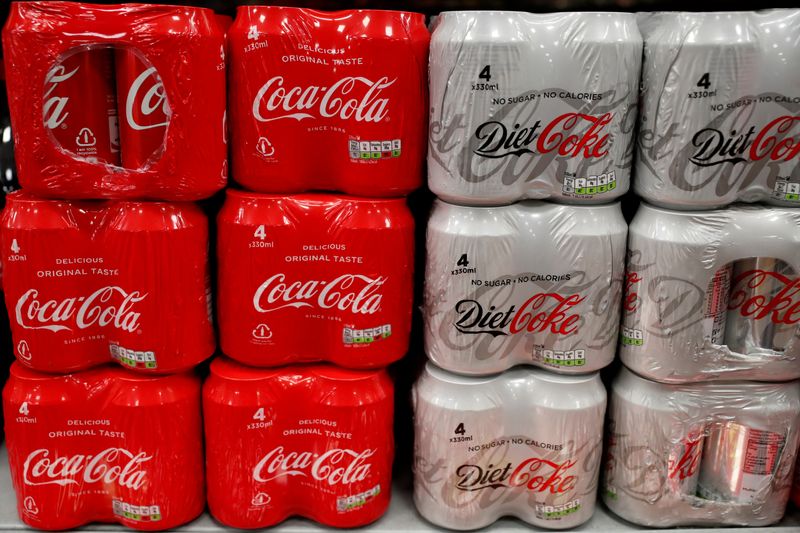(This June 29 story has been corrected to remove reference to aspartame in Weight Watchers yoghurts in paragraph 6)
By Richa Naidu and Savyata Mishra
LONDON (Reuters) - Consumers, food companies, retailers and restaurants need to decide whether to fight back or find alternatives to one of the world's most common artificial sweeteners, as a leading global health body prepares to declare it a possible carcinogen. On Thursday, Reuters reported that aspartame, used in products from Coca-Cola (NYSE:KO) diet sodas to Mars' Extra chewing gums, will be listed in July as "possibly carcinogenic to humans" for the first time by the International Agency for Research on Cancer (IARC), the World Health Organization's (WHO) cancer research arm. The IARC ruling does not take into account how much of a product a person can safely consume. This advice for individuals comes from a separate WHO expert committee on food additives, known as JECFA (the Joint WHO and Food and Agriculture Organization's Expert Committee on Food Additives), alongside determinations from national regulators.
Several consumer industry trade bodies - whose members use aspartame - on Thursday rejected the IARC’s assessment. “The headlines could have a negative impact on sales volumes of lower-calorie sodas, which is really a function of how much attention the story garners," Garrett Nelson, senior equity analyst at CFRA Research, said.
Shoppers can find aspartame in some Snapple drinks and Conagra’s Mrs. Butterworth's syrups."We think this report is likely to cause beverage companies and trade groups both to challenge the findings and swap to substitute sweeteners in their recipes such as stevia,” Nelson said.
He added companies have likely started testing recipes to ensure that the taste of their products remains consistent. To be sure, analysts said consumer companies might not immediately rush into reformulating, waiting instead for food and drug agencies around the world to take a stance on IARC’s assessment.
Another issue is how quickly other types of sweeteners could be produced in sufficient volume to provide substitutes as aspartame, a mainstay ingredient of packaged foods for decades, is one of the world's most widely-used sweeteners.
Regulators have authorised it for use globally after reviewing all the available evidence, while major food and beverage makers have for decades defended their use of it.
“Aspartame has been in use as an intense sweetener for more than 30 years in the UK. It is typically used as a concentration of up to 500 mg/litre but usually less as it is used in blends with acesulfame K,” Tom Sanders, professor emeritus of Nutrition and Dietetics, King’s College London, said.
HARD HABIT TO BREAK Nonetheless, some big companies have in recent years followed a trend of removing - or reducing - aspartame from their products over the concerns of some consumers and health professionals.
In 2014 General Mills (NYSE:GIS) swapped the aspartame in Yoplait Light for the sweetener widely known as Splenda. Packs of 'Zero Sugar' chocolate made by Hershey's state they are "Aspartame Free". It has, however, been a challenge to break the habit. PepsiCo (NASDAQ:PEP) had aspartame removed from some U.S. diet sodas in 2015, replacing it with a blend of sucralose and acesulfame potassium, only to add it back to some products a year later - and then remove it again in 2020. Sweeteners have varying levels of sweetness and price, and are different chemical compounds, making it difficult to simply swap ingredients. Aspartame, for example, is about 200 times sweeter than sugar and costs more than saccharin, roughly the same as sucralose and less than stevia, a sweetener industry source said. “You need to look at the shelf life, how it reacts to storage and hyperactive drying, and to heating, the food processing etcetera,” the source said. “So aspartame wouldn't necessarily be able to be replaced one-to-one by any other sweetener.” Sales of some sodas and sweet foods and beverages have been on the decline for more than a decade as some consumers worry about eating too much sugar, while others shift away from diet items over concerns about sweeteners.
